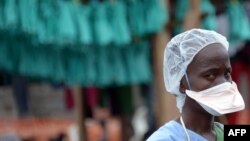Liberia is expected to be declared free of Ebola Thursday by the World Health Organization (WHO), effectively ending the outbreak in West Africa that has killed more than 11,000 people in the past two years.
Sierra Leone and Guinea, the two other West African nations affected by the epidemic, were declared free of the disease in November and December, respectively, last year.
Two previous attempts to declare Liberia free of the virus ended when infections re-emerged.
International support praised
U.N. Secretary-General Ban Ki-Moon said Wednesday the end of Ebola transmission in West Africa is a testament to what can be achieved when the international community works alongside national governments in caring for their people.
Ban also called on the world to make good on its pledges to care for the more than 10,000 Ebola survivors.
However, Ban and WHO Director Margaret Chan warned Wednesday that the region could still see flare-ups of the virus.
Tolbert Nyenswah, Liberia’s deputy minister of health for public health and head of the country’s Ebola response, said despite the global concern, Liberia has the resiliency and capacity to contain any resurgence of the virus.
“We’ve shown in Liberia that the health care system has the human resource capacity, infection prevention and control capacity, health care workers are vigilant, and response workers are vigilant. So if there is any flare-up of the Ebola virus disease, we can jump on it quickly, do the test within 24 hours, isolate the cases, and reduce secondary infection,” Nyenswah said.
Response strategy
He said the country has developed a three-point response strategy to contain the spread of the virus, including testing bodies of Ebola victims and continued testing of survivors.
During a speech to the United Nations last September, Liberian President Ellen Johnson Sirleaf thanked the international community and its contributions to Liberia during the Ebola outbreak.
"We remain grateful to all of you for the outpouring of support and assistance as we faced down the deadly Ebola virus disease, the greatest modern threat to global public health," Sirleaf said in her address to the United Nations General Assembly.
She said the response exemplified the capacity of the U.N. to respond to threats to collective threats to humanity.




